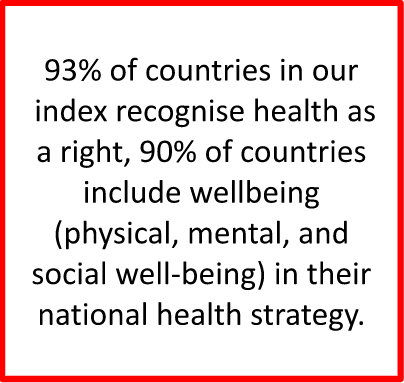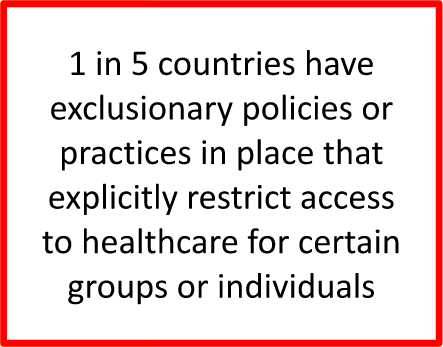In the UK for example, black women are four times more likely than white women to die in childbirth. Furthermore, babies that are black or black-British, Asian or Asian-British have a more than 50% higher risk of perinatal mortality, compared to white-British babies.
Typically, people with the highest incomes from dominant or majority groups enjoy the best health and the most years of their lives in good health—while people with lower incomes from marginalised groups are most vulnerable to morbidity and mortality. There is a need to think dynamically about the role of structural barriers and sociocultural influences and how they impact holistic health:this is where inclusivity in health comes in. It’s about challenging us to think differently about health: exploring new partnerships, better understanding of what good health means to the different communities within our societies, engaging with the public and thinking outside the box to bring new stakeholder groups into action.
In October we launched the Health Inclusivity Index, developed by Economist Impact and supported by Haleon. The first edition of a three-year research program assessing the state of health inclusivity in an initial 40 countries, based on three domains: health in society, inclusive health systems, and community and individual empowerment. I had the pleasure of sharing a stage with influential opinion leaders during the launch event–organised by Haleon at the Wellcome Collection—where we discussed how inclusivity is essential to better health for all. We explored the role of policy in facilitating collaboration to improve health and removing structural barriers to accessing care, and the critical need to match policy with structured implementation mechanisms.
 The majority (93%) of countries in our index recognise health as a human right; only Jordan, the UAE, and the US fail to do so. All but seven countries also recognise that health (as a human right) means more than access to healthcare and includes access to safe drinking water, sanitation, food, housing and other requirements for a health-promoting environment. Despite this one in five countries have exclusionary policies or practices that explicitly restrict access to healthcare for certain groups or individuals. Six of these eight countries are also countries who claim to recognise health as a human right. Professor David Napier, professor of medical anthropology at University College London, introduced the concept of defining “who we, (the population) are”. He highlighted that governments must define “we” and this is often narrowly focused on the majority, leaving those who fall outside of this definition of ‘we’ without access to social services.
The majority (93%) of countries in our index recognise health as a human right; only Jordan, the UAE, and the US fail to do so. All but seven countries also recognise that health (as a human right) means more than access to healthcare and includes access to safe drinking water, sanitation, food, housing and other requirements for a health-promoting environment. Despite this one in five countries have exclusionary policies or practices that explicitly restrict access to healthcare for certain groups or individuals. Six of these eight countries are also countries who claim to recognise health as a human right. Professor David Napier, professor of medical anthropology at University College London, introduced the concept of defining “who we, (the population) are”. He highlighted that governments must define “we” and this is often narrowly focused on the majority, leaving those who fall outside of this definition of ‘we’ without access to social services.
According to our findings there is a clear role for inclusivity in improving health and plugging the inequitable gap in outcomes for the most vulnerable. While life expectancy has improved globally, healthy life expectancy has not, meaning we are living more of our life in poor health. Countries with a higher inclusivity index have populations that live for longer in better health.
 We know that inclusivity goes beyond the provision of services. Barriers to health prevent individuals within a population from accessing services, even when they are readily available. Services that are free at the point of use are not inclusive if they are under-resourced, low in quality, have limited hours of service, do not cater to language differences and require long-distance travel. Baroness Tanni Grey-Thompson, a member of House of Lords, detailed how under-resourced they are and therefore lack the capacity to effectively respond to the overwhelming number of public requests.
We know that inclusivity goes beyond the provision of services. Barriers to health prevent individuals within a population from accessing services, even when they are readily available. Services that are free at the point of use are not inclusive if they are under-resourced, low in quality, have limited hours of service, do not cater to language differences and require long-distance travel. Baroness Tanni Grey-Thompson, a member of House of Lords, detailed how under-resourced they are and therefore lack the capacity to effectively respond to the overwhelming number of public requests.
People need the capacity to engage with and influence their health, recognising that many barriers are outside of their control. Examples include being time poor - lacking the time to exercise or prepare healthy food and having a job that does not pay for time off to seek healthcare. Language barriers and limited literacy skills,—particularly health literacy and the ability to understand health information. Domain 3 of our index, “Community, and Individual Empowerment”, emerged as the strongest driver of inclusivity. Countries that prioritised empowering local communities—removing these socio-cultural barriers—and placing individuals at the centre of service delivery, were among the highest-scoring for health inclusivity. Eight of the top ten scoring countries achieve their highest score in this domain. Beyond this, Domain 3 has the strongest correlation with overall inclusivity score, indicating that it is the best predictor of a country’s overall score in the index.
People need the capacity to engage with and influence their health, recognising that many barriers are outside of their control. Examples include being time poor - lacking the time to exercise or prepare healthy food and having a job that does not pay for time off to seek healthcare. Language barriers and limited literacy skills,—particularly health literacy and the ability to understand health information. Domain 3 of our index, “Community, and Individual Empowerment”, emerged as the strongest driver of inclusivity. Countries that prioritised empowering local communities—removing these socio-cultural barriers—and placing individuals at the centre of service delivery, were among the highest-scoring for health inclusivity. Eight of the top ten scoring countries achieve their highest score in this domain. Beyond this, Domain 3 has the strongest correlation with overall inclusivity score, indicating that it is the best predictor of a country’s overall score in the index.
What should be done?
-
Don’t stop campaigning for universal health coverage and the social determinants of wellbeing —they are critical to expanding access to healthcare particularly for the most vulnerable
-
Empower communities and enable self-agency:an effective approach to expanding access to whole health. During our discussions, Katy Jon Went, head of methodology at the Human Library, reminded us at the event of the “need to humanise the data” recognising that there are individuals, communities and societies behind the numbers
-
Work from the outside in. By deliberately supporting vulnerable groups, you will help improve health for all and remove structural barriers that mostly impact the minority
-
Pull in the same direction: elevate the importance of coordination to achieve common goals
-
Advocate for high-quality data collection, and “real-world evidence” for inclusivity
Nations must tackle all three domains of the Health Inclusivity Index to achieve an inclusive system that promotes universal wellbeing . The Health Inclusivity Index provides the first ever quantitative measure of inclusivity, but also provides a framework for countries to pull levers that drive inclusivity and improve health for all.
For more information, explore the Health Inclusivity Index Hub and white paper.




